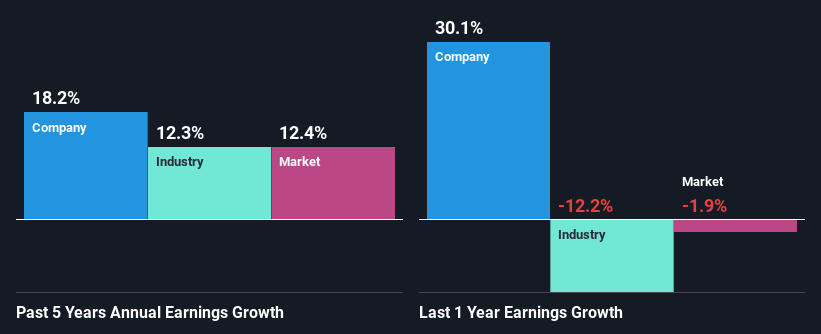Property Franchise Group’s (LON:TPFG) stock is up by a considerable 6.8% over the past month. Since the market usually pay for a company’s long-term fundamentals, we decided to study the company’s key performance indicators to see if they could be influencing the market. In this article, we decided to focus on Property Franchise Group’s ROE.
ROE or return on equity is a useful tool to assess how effectively a company can generate returns on the investment it received from its shareholders. Simply put, it is used to assess the profitability of a company in relation to its equity capital.
Check out our latest analysis for Property Franchise Group
How Do You Calculate Return On Equity?
Return on equity can be calculated by using the formula:
Return on Equity = Net Profit (from continuing operations) ÷ Shareholders’ Equity
So, based on the above formula, the ROE for Property Franchise Group is:
19% = UK£7.4m ÷ UK£38m (Based on the trailing twelve months to June 2023).
The ‘return’ refers to a company’s earnings over the last year. That means that for every £1 worth of shareholders’ equity, the company generated £0.19 in profit.
What Has ROE Got To Do With Earnings Growth?
We have already established that ROE serves as an efficient profit-generating gauge for a company’s future earnings. We now need to evaluate how much profit the company reinvests or “retains” for future growth which then gives us an idea about the growth potential of the company. Assuming everything else remains unchanged, the higher the ROE and profit retention, the higher the growth rate of a company compared to companies that don’t necessarily bear these characteristics.
A Side By Side comparison of Property Franchise Group’s Earnings Growth And 19% ROE
To begin with, Property Franchise Group seems to have a respectable ROE. Further, the company’s ROE compares quite favorably to the industry average of 6.3%. Probably as a result of this, Property Franchise Group was able to see a decent growth of 18% over the last five years.
We then compared Property Franchise Group’s net income growth with the industry and we’re pleased to see that the company’s growth figure is higher when compared with the industry which has a growth rate of 12% in the same 5-year period.
Earnings growth is an important metric to consider when valuing a stock. What investors need to determine next is if the expected earnings growth, or the lack of it, is already built into the share price. By doing so, they will have an idea if the stock is headed into clear blue waters or if swampy waters await. Is TPFG fairly valued? This infographic on the company’s intrinsic value has everything you need to know.
Is Property Franchise Group Making Efficient Use Of Its Profits?
The high three-year median payout ratio of 62% (or a retention ratio of 38%) for Property Franchise Group suggests that the company’s growth wasn’t really hampered despite it returning most of its income to its shareholders.
Additionally, Property Franchise Group has paid dividends over a period of nine years which means that the company is pretty serious about sharing its profits with shareholders.
Summary
Overall, we are quite pleased with Property Franchise Group’s performance. Especially the high ROE, Which has contributed to the impressive growth seen in earnings. Despite the company reinvesting only a small portion of its profits, it still has managed to grow its earnings so that is appreciable. That being so, according to the latest industry analyst forecasts, the company’s earnings are expected to shrink in the future. Are these analysts expectations based on the broad expectations for the industry, or on the company’s fundamentals? Click here to be taken to our analyst’s forecasts page for the company.
Have feedback on this article? Concerned about the content? Get in touch with us directly. Alternatively, email editorial-team (at) simplywallst.com.
This article by Simply Wall St is general in nature. We provide commentary based on historical data and analyst forecasts only using an unbiased methodology and our articles are not intended to be financial advice. It does not constitute a recommendation to buy or sell any stock, and does not take account of your objectives, or your financial situation. We aim to bring you long-term focused analysis driven by fundamental data. Note that our analysis may not factor in the latest price-sensitive company announcements or qualitative material. Simply Wall St has no position in any stocks mentioned.


